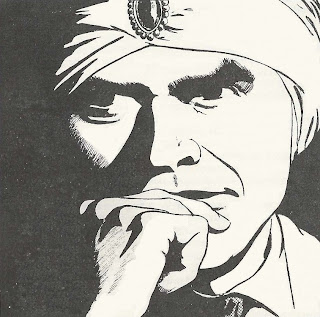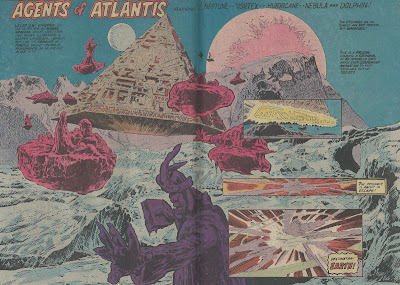The first step in creating a Daredevils character is to distribute “75 points among the Attributes.” In my opinion, the first step should be to roll on the Character Background Table since the results of this roll have a bearing on career choices. I roll '13' on 1d100; not a good omen (or a lucky roll). This result represents (among other things) a 'poor' education. My nascent character gets an initial score in the American History and American Culture skill; he – I assume the masculine gender – also has “Double initial score in English Language.” (By comparison, someone with 'excellent' education would have “Quadruple initial score.”) Before determining Attributes, I shall establish the length of his pre-adventure career. The result of 4d10 gives me 18; somewhat less than the average roll of 22 years. Anyway, rolling 1d6 generates the number two. I add this to fourteen to find out that the character began his pre-adventure career at age 16. My guy will begin play when he is 34 years old (16 + 18). Assuming a campaign start date of 1933, he was born in 1899.
So far, the character lacks a good education and has fewer years than average with which to acquire skills. I roll 1d100 on the Physical Aspect Chart and get '79.' This means 'above average' height and weight (5'11" – 6'2"; 77 – 86 kg). (Why did they use imperial height but metric weight?) I imagine the character attempting to lift himself out from his 'poor' background by physical means. I say he tries to be a boxer and distribute points among Attributes appropriately.
I assign 15 points each to Strength, Deftness, and Health for purposes of optimization. (With a value of 15, the character has a 1d10 'Effect Die' with regard to that Attribute. With a value of 14, the 'Effect Die' would be 1d6.) The remaining Attributes – Wit, Will, and Speed – get 10 points each; this is considered the low end of average. By now, the character deserves a name; I'll call him Danny Sweet.
Now I turn my attention to the psychological profile and obtain the following base values for Danny's Talents: Charismatic 0; Combative 0; Communicative 0; Esthetic 0; Mechanical 0; Natural +1; Scientific 0. A roll of 2d6 results in 5; this added to twenty gives Danny 25 points to distribute among the Talents. Because he is a boxer, I assign ten points to Combative. It's possible to leave a Talent's value at zero, but that's not how I roll. I give one point each to the remaining five Talents at zero. There are ten points left. I assign four to Charismatic, three to Communicative, and the last three to Natural. Danny's final Talent values are: Charismatic 5; Combative 10; Communicative 4; Esthetic 1; Mechanical 1; Natural 4; Scientific 1.
Danny's first career period begins in 1915. I want him to be a boxer so the appropriate career is 'Athlete/Sportsman.' At Danny's age there are no requirements for entering this career. A roll of 8 on 2d6 means this first career period will last eight years. In the first year of a new career, a character learns whatever 'Automatic Skills' associated with the career. Athlete is one of the two careers which doesn't have an Automatic Skill, which is bogus. This means Danny will spend a year gaining no benefits other than financial. The following year, I select Brawling from the list of Available Skills because this is the Daredevils Skill most akin to boxing. For the third year, Danny takes 1d3 more Attribute points, but these won't be added until later in the character creation process.
Because of the Great War, Danny can interrupt his Athlete career and join the military. Even if he didn't choose to enlist, he could be drafted. Danny opts to enlist. The requirements for the Military career are (1) a “Health Attribute Saving Throw” and (2) no criminal record. Well, Danny doesn't have a criminal record. His Health is 15. This means I must roll 7 or less on 1d20 to succeed with the Saving Throw. I manage to roll a 5. “The Infantry is assumed to be the branch of service unless he makes the Requirements of one of the other branches.” Danny might as well try to get into one of the other branches. The Air Corps requires a Deftness Saving Throw. With a Deftness of 15, he needs a 7 or less. I roll a 4, which I wasn't expecting. Danny's in the Air Corps! The Automatic Skills for the Air Corps are Pilot and Navigation.
According to page 19:
All player characters are assumed to be officer material. They start as Non-commissioned officers and may make one roll per year for promotion... Under wartime conditions, the character may make an additional roll during the first year in service.The required percentile roll is Wit + Will + Combative + years in the 'College' career, so Danny has a 30% chance. For the first year, I roll '01' and '89.' For the second year, a roll '09.' (The War lasts two years.) In total, two promotions! Instead of Danny Sweet, boxer, we have Lt. Daniel F. Sweet, war hero. It's not the pre-adventure career I had planned on, but it will do. Anyway, each promotion entitles a character to an additional initial score in a Skill; so Danny takes Pistol and Mechanic from the list of Available Skills for the Air Corps. For the second and final year of the War, Danny takes Pilot again. If Danny succeeds in a Wit Saving Throw, he gets French Language as a Skill. Danny's Wit is 10, so the Saving Throw is 5 or less on 1d20. I roll a 14 and Danny doesn't pick up a language.
In 1920, Danny resumes his pre-War career, Athlete/Sportsman. He has five more years in this career term. Danny could continue as a boxer, but there are other options. In this career, almost all 'Practical' Skills are available, including – now that the War is over – Pilot. I suppose Danny could be a 'Sportsman' in terms of a stunt pilot or barnstormer. If he's going to be a barnstormer, he ought to take two more 'years' of Pilot. I'd like for Danny to take Mechanic again, but that's a 'Task' Skill, not a 'Practical' Skill. So for the final three years of this career term, he takes Brawling for the second time and 2d3 points for Attributes.
What exciting surprises does destiny have in store for Danny? What should he do next? What would YOU do if you were Danny and I wasn't making all of the decisions?





